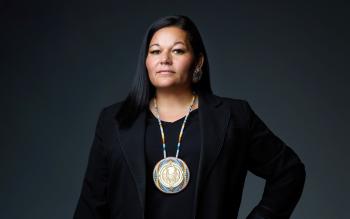Image Caption
Summary
Local Journalism Initiative Reporter
Windspeaker.com
Jodi Calahoo Stonehouse told her Grade 8 classmates that she was going to run for national chief of the Assembly of First Nations one day.
Her heroes at the time were Ovide Mercredi, Phil Fontaine and Matthew Coon Comb, all past national chiefs.
That ‘one day’ has come and Stonehouse is one of seven candidates seeking the position in the upcoming election on July 7.
“I've been working towards that dream ever since. All of the work that I've done in community, at the grassroots level, work I've done at institutions, all my post-secondary education, has all been about preparing me for this role,” said Stonehouse. She has also served two terms on the Michel First Nation council.
“I've taken leadership roles in other systems and my expertise lies in navigating bureaucratic systems and I've been able to make real structural and systemic change, and that's what we need at the national level at this point,” she said.
Stonehouse believes she will bring a unique perspective to the role of national chief as her Alberta band is still fighting for status from the federal government.
“It's what leverages me to be able to assert the role of the national chief. It's my job to lift the voice of the rights holders, which is the chiefs-in-assembly. Being from the Michel First Nation and being disenfranchised, I want to be sure that never happens to any other First Nation,” she said
“We need to make sure that every one of our children have a home to go to, have a community, a safe place, have a place for their ceremony, language, practices and we don't have that. For me that's motivation to support other First Nations to ensure that never happens again.”
The national chief is not supposed to promote Canadian legislation or to prescribe it to First Nation rights holders, said Stonehouse, but to “amplify the rights holders themselves.”
“We’re creating dissension … because the AFN is not a conduit for consultation. Canada has a fiduciary duty to consult with every First Nation on issues that directly impact them…. Our job at the national level is to ensure and facilitate the communication process; to ensure no nation is left behind in these dialogues,” she said.
Stonehouse sets her first priority as “returning the AFN to its original intent. Putting forward what that means in practicality, (which is) a unification strategy.”
Stonehouse understands that legal traditions, value systems, languages and ceremonies differ across the country, but she doesn’t see this as a challenge to her goal of providing a unified front.
“The AFN should never have just one view. We are diverse, complex … so the assembly's job is to make space for each and every one of those positions and they all are legitimate,” she said.
“When the chiefs have mandated a relationship to reflect a particular way (then) that's how the relationship will reflect. My job is to act how my chiefs-in-assembly have requested me to do.”
Stonehouse also wants to combine “innovation and technology with our ancestral knowledge and ancestral systems and our Indigenous laws…so that’s an integrated part of the way the First Nations engage.”
She sees the AFN supporting chiefs through research data and outcomes evaluation tools, which can track resolutions and provide transparency and accountability.
Her third priority is “to mobilize and strategize a devolution plan,” ensuring that chiefs are ready by providing support at the national level.
“Over the next 10 years in regards to shifting powers and authority, are our leaderships prepared? What does that mean? How is it that AFN is going to play a role? What do the chiefs-in-assembly mandate around this?” said Stonehouse.
Part of that preparation will include presenting material to chiefs that they can understand.
“A big part of our role in supporting our chiefs-in-assembly is translation so that chiefs are fully aware of how legislation can impact their lands, their resources, their waters and their citizenship,” she said.
Although Stonehouse is one of three women running for national chief, a position only ever held by a man, she doesn’t believe it’s time for a woman to be national chief as much as she believes “it’s time for me to be the national chief.”
“I had a dream when I was in junior high school that I was the first woman to be introduced as the national chief of the Assembly of First Nations by my grandfather at the time,” she said.
Stonehouse said she doesn’t know what a woman specifically would bring to the position, “but I do know that in our traditions men, women, binary, two-spirited, all have roles and responsibilities and obligations in the lodge. In the political lodge we need to make sure we’re making space for all of our people.”
Stonehouse said she wants to bring “some humility, some humbleness to the role. I think we need to lead at this time with love and compassion and kindness and patience, particularly as …we are just healing as a people. I mean, coming out of genocide, is an atrocity on humanity. I think it's time for us to take a moment, some reflective internal work, and that's the work that I want to do and navigate.”
Also running for the position of national chief are RoseAnne Archibald, Reginald Bellerose, Lee Crowchild, Alvin Fiddler, Kevin Hart and Cathy Martin.
Local Journalism Initiative Reporters are supported by a financial contribution made by the Government of Canada.

